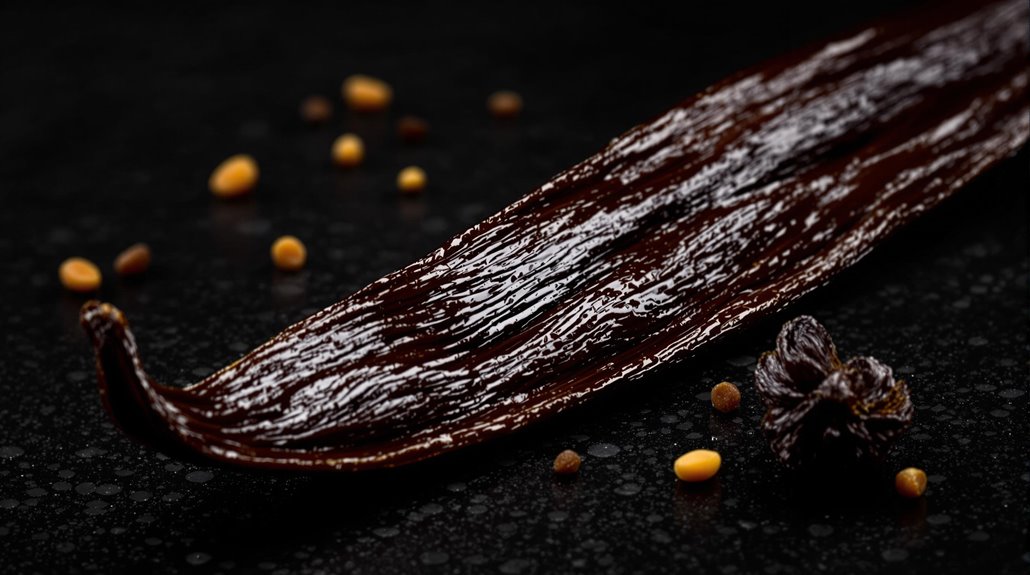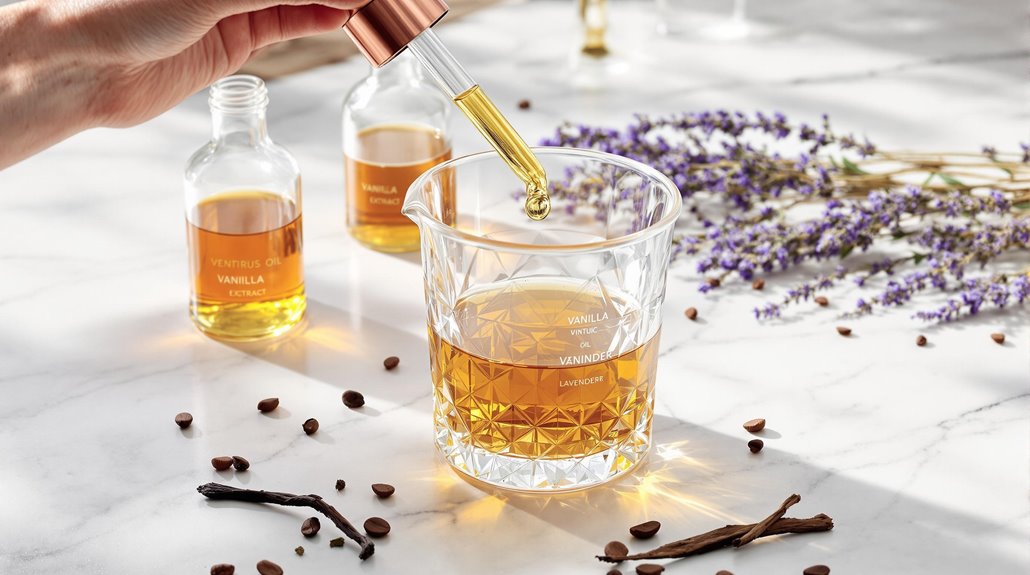Is Vanilla Perfume Safe for Pets? What You Need to Know
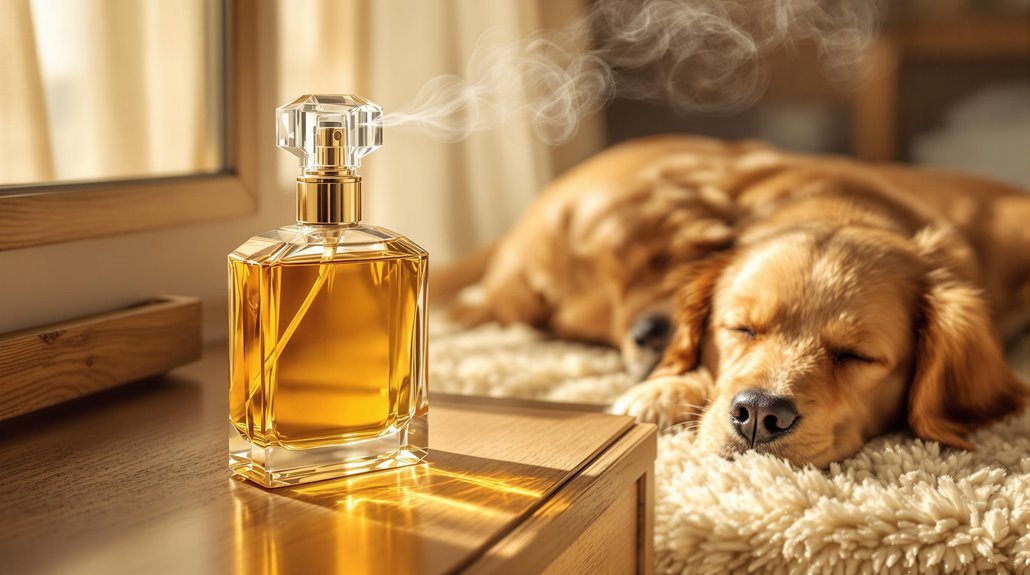
You'll need to be cautious when using vanilla perfume around your pets, especially cats. While dogs have some tolerance for fragrances, cats are particularly sensitive due to their unique metabolic systems and respiratory vulnerabilities. Vanilla perfumes can cause reactions ranging from mild irritation to serious health issues, including breathing problems, skin reactions, and digestive upset. The alcohol content and concentrated compounds in vanilla fragrances pose additional risks if ingested or absorbed through the skin. It's best to opt for pet-specific products or natural alternatives like vanilla bean powder.
Understanding the specific risks and safe alternatives can help protect your furry family members.
Understanding Vanilla and Pet Safety
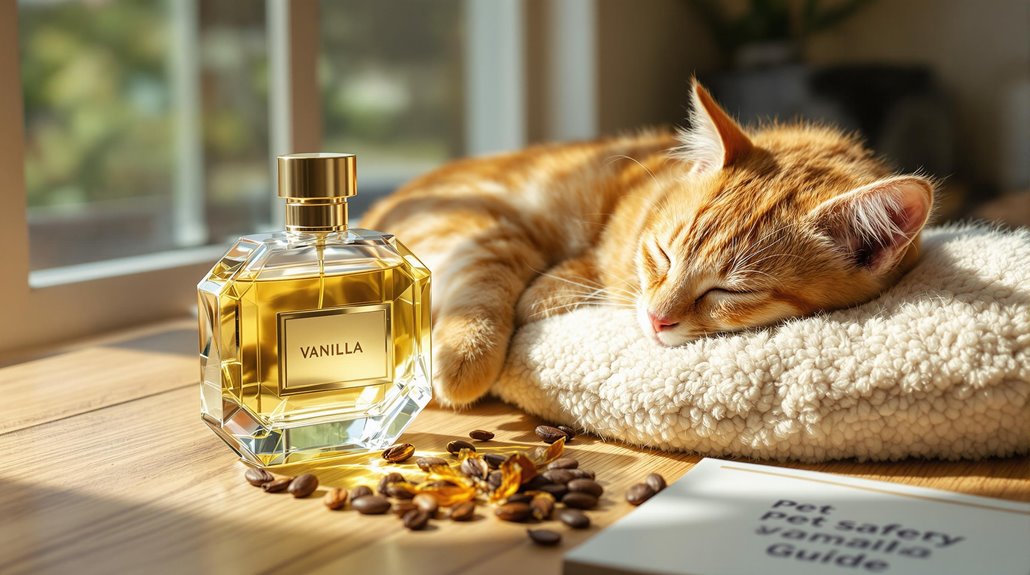
When it comes to vanilla perfume and pets, understanding the potential risks is pivotal for their safety. While many pet owners enjoy vanilla-scented products, it's important to recognize that not all forms of vanilla are safe for your furry companions, especially cats.
Essential oils derived from vanilla can be particularly problematic for pets, as they contain concentrated compounds that animals may struggle to metabolize properly. If you use vanilla-based perfumes or diffuse vanilla essential oils in your home, you should be aware of potential adverse effects, including respiratory issues in enclosed spaces. This is especially central for cat owners, as felines are more sensitive to these substances.
While vanilla itself isn't inherently dangerous in all forms, the concentration and delivery method matter exceptionally. If you're looking for safe alternatives, consider pet-specific products that use vanilla bean powder or paste instead of essential oils or extracts. It's also worth noting that vanilla extract contains alcohol, which can be harmful to pets if ingested. As a responsible pet owner, you'll want to be cautious with any vanilla-scented products and keep them out of your pet's reach to prevent accidental exposure or ingestion.
Different Types of Vanilla Products
Various vanilla products exist in the market today, each carrying different levels of risk for your pets. It's pivotal to understand that not all vanilla products are safe for pets, with some posing significant health risks to your furry companions.
Vanilla essential oil is particularly concerning, as it can lead to essential oil poisoning in pets. While many people believe essential oils are safe, the concentrated nature of vanilla essential oil makes it potentially toxic to animals. Similarly, vanilla extract contains alcohol, which can cause serious digestive problems and affect your pet's nervous system.
When it comes to synthetic fragrances in vanilla perfumes marketed as "safe for pets," you'll want to exercise caution. These products often contain undisclosed ingredients that may harm your pets. Instead, consider using vanilla bean powder or paste if you're looking to incorporate vanilla into pet-safe treats or products. These natural alternatives are generally safe to use around pets, provided they're used in appropriate amounts.
Remember that vanilla-flavored human foods pose additional risks, as they may contain other harmful ingredients like chocolate or xylitol. Always check the complete ingredient list before sharing any vanilla-flavored items with your pets.
Risks for Dogs Versus Cats
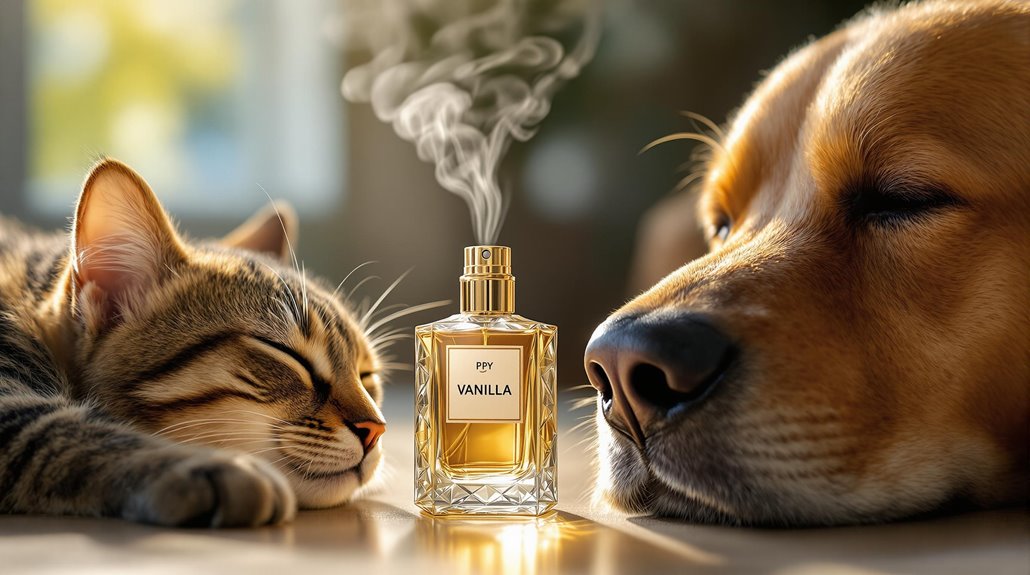
The distinct physiological differences between dogs and cats create varying levels of risk when it comes to vanilla perfume exposure. While dogs typically have a better tolerance for essential oils, cats are extremely sensitive to these fragrances due to their limited ability to metabolize certain compounds.
You'll need to be especially cautious with cats, as they're more susceptible to respiratory issues when vanilla essential oils are diffused in enclosed spaces. Dogs generally handle the fragrance better, though you should still monitor their reaction. If your pet accidentally ingests vanilla perfume, you can expect gastrointestinal problems in both species, but cats face a higher risk of adverse effects due to their metabolic limitations.
When it comes to topical application, you might be able to use diluted vanilla products on dogs under veterinary guidance. However, you shouldn't apply any vanilla-based products to cats, as they'll likely groom themselves and ingest the substance. Remember that the concentration and amount of exposure matter extremely for both pets. What might be safe for your dog could pose serious health risks for your cat, so it's imperative to consider each pet's specific needs and limitations.
Signs of Vanilla Product Sensitivity
Pet owners should remain vigilant for warning signs that indicate vanilla product sensitivity in their animals. If your pet has been exposed to vanilla perfume, essential oils, or other vanilla-containing products, watch for symptoms like vomiting, diarrhea, and unusual lethargy. These adverse reactions can signal that your pet's body isn't tolerating the substance well.
Pay particular attention to your pet's skin, as topical exposure to vanilla products can cause irritation, redness, or itching. This is especially concerning for cats, who may ingest the product while grooming themselves. Cats lack the necessary liver enzymes to process vanilla essential oil safely, making them particularly vulnerable to poisoning.
Watch closely for signs of respiratory distress, which may include labored breathing, coughing, or wheezing after exposure to vanilla fragrances. If your pet shows any of these symptoms or appears unusually sluggish, don't wait to seek veterinary care. Understanding these warning signs will help you make informed decisions about using vanilla-scented products in your home and recognize when your pet needs immediate medical attention.
Safe Application and Usage Guidelines
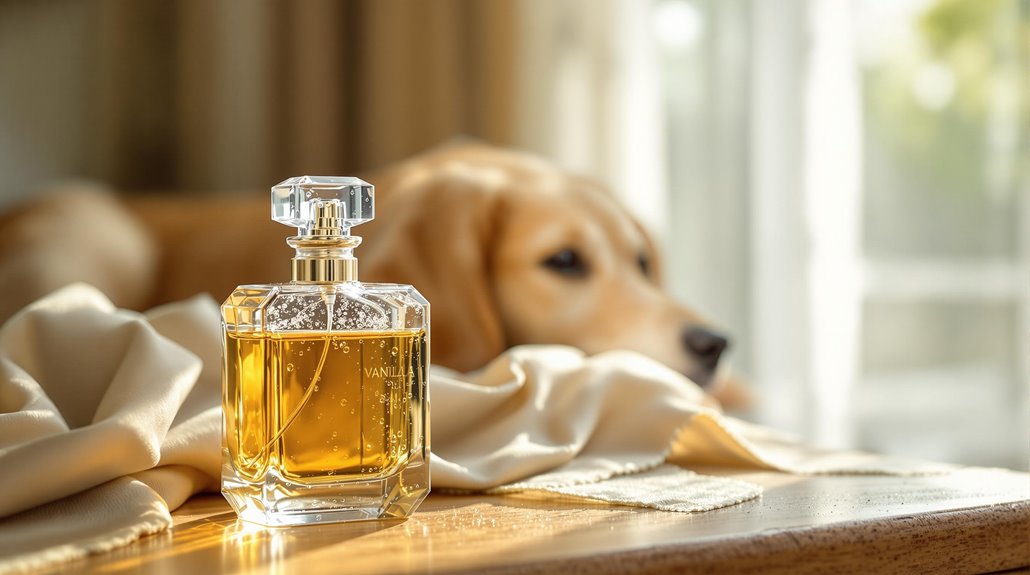
Armed with knowledge about warning signs, you can now implement proper safety measures when using vanilla-scented products around your pets. When using vanilla essential oil, it's imperative to dilute it properly and guarantee your space is well-ventilated. While essential oils are considered safe in moderation, it's always best to err on the side of caution with your furry friends.
For the safest approach, opt for pet-specific products that contain vanilla rather than using human perfumes or concentrated essential oils. If you're using a diffuser, place it in an area where your pet can easily move away if they're uncomfortable. It's best to avoid direct application of vanilla essential oil to your pet's skin or fur, as this can lead to irritation or adverse reactions.
Before introducing any new vanilla-scented products, consult your veterinarian to ensure they're appropriate for your pet's specific needs. Among the safe options are pet-formulated grooming sprays containing vanilla, which are specifically designed with your pet's sensitivity in mind. Remember to start with minimal amounts and monitor your pet's reaction closely.
Alternative Pet-Friendly Fragrance Options
Nature's gentler alternatives offer a wealth of pet-safe fragrance options for your home. While vanilla perfume might pose risks, certain essential oils like lavender, chamomile, and cedarwood can provide sweet and comforting scents that are safer for your cat and dog companions. These alternatives respect your pets' sensitive sense of smell while creating a pleasant atmosphere.
You'll find multiple ways to introduce these pet-friendly fragrances into your living space. Consider switching to soy-based candles or reed diffusers featuring natural scents like lemongrass or geranium. For your pet's grooming routine, opt for fragrance-free shampoos and conditioners that clean effectively without harsh chemicals.
To mask pet odors naturally, you don't need synthetic air fresheners. Try placing bowls of dried citrus peels throughout your home or creating sachets filled with dried herbs. For cleaning and deodorizing pet areas, simple solutions like baking soda and vinegar work effectively without introducing potentially harmful scents. These natural alternatives not only keep your home smelling fresh but also guarantee your pets' well-being by avoiding synthetic fragrances that could cause discomfort or health issues.

